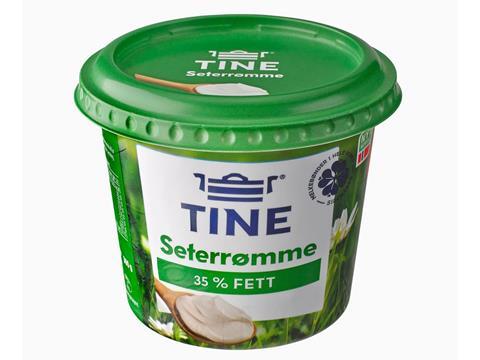
Berry Superfos has worked alongside Norwegian dairy company TINE to replace the polystyrene pots of its Rømme products and one of its sour creams with polypropylene alternatives containing 50% recycled material in pursuit of the company’s sustainability strategy.
The new pots have been introduced for its Rømme 300g Lettrømme 17%, 300g Seterrømme 35% and 300g Creme Fraiche 35% products. TINE is set to steadily integrate rPP into six of its other potted products, with the long-run goal being to utilise rPP in its entire packaging portfolio for cooking products.
Berry Superfos is said to have worked closely with TINE on the design for the polypropylene pots, which are thought to be most robust than their polystyrene counterparts and improve customers’ experience with the product.
“At TINE, we want all our packaging to be made of renewable or recycled material by 2025,” said Bjørn Malm, head of sustainability at TINE. “Our new packaging solution for Rømme and sour cream is an important step towards our goal.
“If we are to reach the EU goals, it is evident that both Norway and all other EU countries must increase material recycling by tens of thousands of tonnes in the years to come. Switching from PS to PP is a good way of contributing to this since a larger share of PP than PS is recycled. Therefore, we are very pleased to have successfully converted to 50% rPP based on the mass balance approach for three of our main products.
“PP is a material with a lower climate footprint than PS because, among other things, it has a lower melting point and is therefore less energy intensive. Add to this the fact that 50% of the PP in our new pots consists of recycled PP (rPP), then we have improved the climate footprint of the pots quite a bit and we save 110 tonnes of virgin fossil plastic material.”
“Our collaboration with Berry Superfos has been very good, well focused, and highly valued throughout the project,” added Camilla Løken, brand manager for TINE’s cooking assortment. “With a positive and helpful attitude and thanks to its ISCC PLUS certified site in Lidköping, Sweden, Berry Superfos made the conversion in a short time and showed great flexibility related to design deadlines and delivery of packaging on time to our facilities.
“Berry also followed up on large-scale testing at our productions facilities and has assisted during the test runs. In short, we are very satisfied with our collaboration.”
In another collaboration, Berry Superfos redesigned its 1kg UniPack container to reduce its weight to 35g; the container is currently packaging Milchwerke Schwaben’s yoghurt- and milk-based dessert brand, Weideglück.
Last year, Müller Milk & Ingredients implemented recycled PET into its cream pot packaging portfolio with the intention of cutting down on 500 tonnes of virgin plastic waste; COEXPAN’s innovation and technology centre, INNOTECH, also trialled the production of yoghurt pots from polystyrene grade which it claimed to source from household food packaging waste.














No comments yet